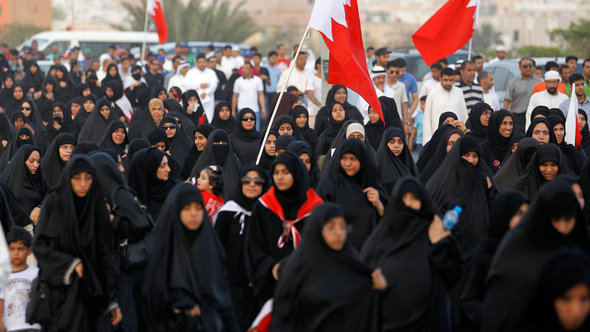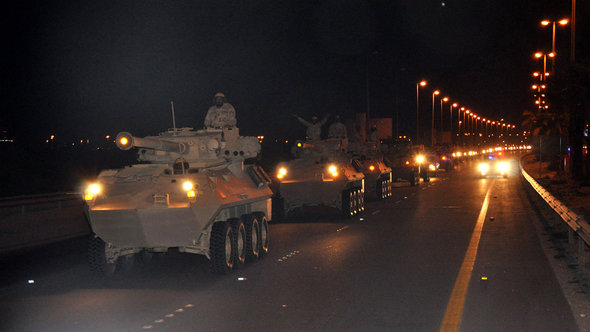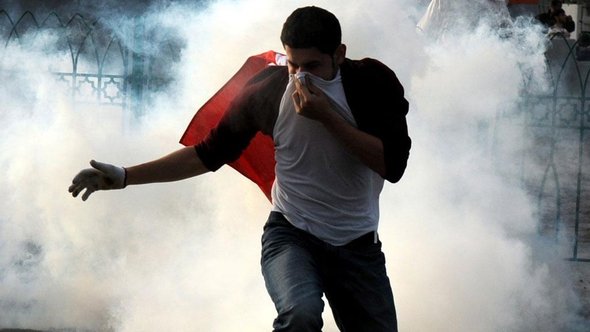Reformers on the Defensive
There seems to have been a glimmer of hope in the ongoing crisis in Bahrain over the past few weeks. Although the government and the opposition have been at loggerheads since the violently quashed protests in the spring of 2011, rumours of a change in the Saudi Arabian position have begun circulating in Manama.
According to reports, the Saudi Arabian government had given its Bahraini allies an ultimatum: it was time to settle the domestic situation after almost two years of unrest.

An unnamed Saudi Arabian emissary is even said to have spoken to the largest opposition party, al-Wifaq ("Consensus") to persuade them back to the negotiating table. The initiative seems to have been a success – in mid-January 2013 the government made an offer of new talks to the opposition, which al-Wifaq accepted.
Superficial reforms
Since early 2011, a conflict has been smouldering between the Khalifa family's regime and a mainly Shi'a opposition. Shi'a Muslims make up 50 to 70 percent of Bahrain's population and have been calling for complete socioeconomic and political equality with the country's Sunnis for decades.
The present king, Hamad bin Isa Al Khalifa, aroused great expectations after his 1999 coronation, when he announced democratic reforms and permitted political "associations" akin to parties. Although opposition groups such as al-Wifaq were founded, the changes to the political system never went beyond the cosmetic level.
A number of elections were held, yet the Shi'a opposition continued to protest against the lack of legislative competencies granted to the elected parliamentary chamber, the make-up of electorate districts, which they felt favoured Sunni candidates, and the naturalisation of new Sunni citizens from Arab countries and Pakistan. The resulting tensions came to the surface in the protests of spring 2011.
Fearing they would lose control of the protests, the Bahraini security authorities called on Saudi Arabia for help in March 2011. Along with the United Arab Emirates, Riyadh sent troops to protect strategic hubs and important institutions, releasing Bahraini personnel to concentrate on quashing the demonstrations.
Over the next few weeks around thirty people died, most of them demonstrators. This was followed by a wave of arrests by the thousands, with the protest leaders given long prison sentences.
Collision course
The political divide was intensified over the subsequent months. On the regime side, the reformers led by Crown Prince Salman bin Hamad Al Khalifa took on a defensive stance. Proponents of a hardline approach to the opposition took control in their stead.

This faction is led by the king's septuagenarian uncle and longstanding prime minister, Khalifa bin Salman Al Khalifa, who has been running the government since 1971 and advocates an authoritarian law-and-order state.
Other avowed opponents of Shi'a Islam in powerful positions include the "Minister of the Royal Court" Khalid bin Ahmad Al Khalifa and his brother, the military commander-in-chief Khalifa bin Ahmad. To date at least, they have benefited from the support of the Saudi Arabian government, which shares their view of political compromise with the Shi'a opposition as a dangerous sign of weakness.
On the opposition side, proponents of a compromise solution have also come under pressure from more radical Shi'a groups. The most significant of them calls itself al-Haqq (the truth). Al-Haqq formed a splinter group from al-Wifaq in 2005 because it rejected participation in parliamentary elections. This problem intensified from 2011 in particular, however, as al-Wifaq's policies were obviously not leading to success. Many young people turned away from the moderate Islamists and joined the "14 February Movement".
Social networks as a means to a political end
Rather like in Egypt, their members use social networks to plan protests. They begin street battles on an almost daily basis, with young men in the Shi'a villages around Manama attacking security forces with Molotov cocktails and stones. This youth movement is significant in that it has made it more difficult for al-Wifaq to take up the government's offers of talks. It was not until early February 2013 that the organisation abandoned its defensive stance, although it was not fully convinced.
The reports on the Saudi Arabian initiative make it clear that solving the conflict in Bahrain is impossible without help from its neighbour. It's an open secret that Riyadh set tight restrictions on King Hamad's reform programme from an early point.
Saudi Arabia's ruling family not only wants to avoid a constitutional monarchy in Bahrain becoming a model for its own opposition. It also considers equality for Shi'a Muslims a threat because their fellow believers in Saudi Arabia are even more drastically disadvantaged, particularly in religious and cultural respects.
Rebellious Shi'a youths
In Saudi Arabia's Eastern Province, where the majority of the country's approximately two million Shi'a live, this has led to a series of unrest and conflicts with security forces since 2011. In many cases these were triggered by young demonstrators reacting to events in Bahrain.

Since July 2012 young Shi'a have begun following the Bahraini example, attacking government buildings and police patrols with Molotov cocktails and setting fire to tyres on busy streets by night. The Saudi Arabian leadership has reacted with partly brutal repression, also exerting major pressure on the moderate Shi'a opposition to bring the rebellious young people back into line.
With this in mind, it is hard to envisage Riyadh pressing Bahrain to grant equality to Shi'a Muslims and institute a constitutional monarchy. Instead, most of the people I spoke to in Manama during April 2013 assumed Riyadh had ordered its ally Bahrain to quell the unrest at last, albeit without imposing a political concept.
Representatives of al-Wifaq assume the ruling family made its latest offer of dialogue in reaction to pressure from Saudi Arabia but is not interested in it being a success. They suspect it is attempting to provoke the opposition into breaking off talks so that the government can then claim it tried its best but al-Wifaq was not willing to compromise.
Evidence of a more pragmatic Saudi policy
So the indications are that the Saudi Arabian initiative will not help solve the conflict once and for all. The aim is more likely to tidy up one frontline in this time of crises in the region, though it is not clear whether this is to happen by compromise or by more effective repression, or both.
Whatever the case, the news from Bahrain indicates a more pragmatic policy approach by the Saudis. The new interior minister, Muhammad bin Naif, is generally considered the architect of this development. His father Naif was interior minister from 1975 up until his death in June 2012, and the most important contact man for Bahrain's hardliners – sharing their attitude towards the Shi'a.
Muhammad bin Naif, however, is seen as a pragmatic administrator; many opposition activists in Saudi Arabia and Bahrain greeted his appointment with cautious optimism. Should the Bahraini initiative really be down to this change of staff, it would be an initial sign of urgently needed changes in Saudi Arabia's policy towards Bahrain, regardless of how ineffective the initiative itself may be.
Guido Steinberg
© Qantara.de 2013
Dr. Guido Steinberg holds a PhD in Islam Studies and is a fellow of the German Institute for International and Security Affairs (SWP) in Berlin.
Editor: Lewis Gropp/Qantara.de
